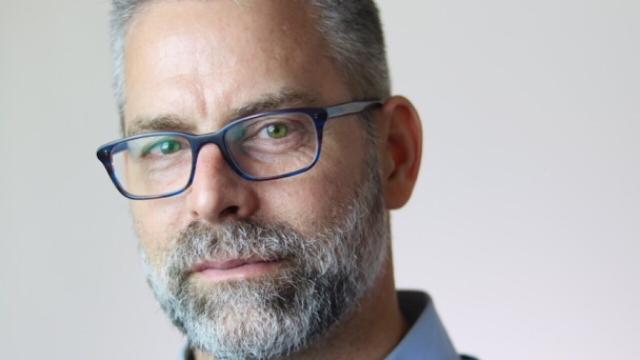David Adam Gill is a playwright who penned a comic play titled “Experimenting With Katz” that centers on a gay man named Michael Katz who struggles to come out to his mother (who believes she has found the perfect woman for him) without causing her a nervous breakdown. Tackling themes of acceptance and love with a twist, the story takes place during a snowstorm in the city of Chicago.
David Adam Gill has had work produced in a number of venues in New York and elsewhere. He also teaches playwriting courses and is very excited to see “Experimenting with Katz” on stage in NYC at the end of September 2018.
David granted an exclusive interview where he discussed this play and more on September 16, 2018.
Theater, inspiration, and comedy
Meagan Meehan (MM): How did you get into playwriting and what about the theater most draws you to it?
David Adam Gill (DAG): I grew up writing stories and prose – even minored in writing arts in college – but my writing was very influenced by plays and old movies, so it was character and dialogue driven to begin with. Add to that my acting background, and I found it wasn’t a difficult leap to theatrical writing for me. I’ve always loved the theater, a love that both my parents instilled in me from a very early age. I felt I instinctively understood the theater, the stage, and therefore could be a more effective playwright than, say, a novelist or short story writer.
MM: What inspired “Experimenting With Katz” and what most interests you about the characters?
DAG: Experimenting with Katz was inspired by my own coming out the story, as well as the coming out stories of friends who didn’t have it as easy as I did. Like Michael Katz, I did come out to my mother twice, two years apart, but she didn’t act as crazy as Kitty does with Michael.
The rest of my family was wonderful and supportive, so they made it easier for me. I did have several friends who went through hell with their families, suffered through very dark periods because of it, and that was very upsetting to me. I wanted to write a play that addressed these varied emotional experiences of coming out, so the play is a mash-up of mine and others journeys.
What interests me the most about these characters is that – beyond the verbal jousting, the misunderstandings, the self-sabotage, the utter ridiculousness of their arguments – they love each other intensely, as misguided as that love may be. The one comment I continually get after people have seen this play is that these characters are all familiar in some way; they are real to the audience, and that is nice to hear. The other comment I love is “were you in the room taking dictation when I came out to my mother or father?”
MM: You set this play during a snowstorm in Chicago. So, have you ever been caught in conditions like that?
DAG: I lived in Chicago for seven years, and the weather (especially in winter) forced people to stay indoors and essentially deal with one another.
I used to watch the weather channel continuously because it dictated my day to the smallest detail – from needing a hat or umbrella to whether or not the buses were running so I could get to get to work. It’s no mistake that the weather is another character in the play.
MM: “Experimenting With Katz” covers some serious topics yet it is a comedy. Was it tough to write humor into this subject matter?
DAG: I generally think in terms of comedy, so it’s not that it was difficult to write humor into this subject matter, but that the subject matter became easier to write about because of the humor. My Number One Writing Mantra is that comedy and drama are not mutually exclusive. I find it’s much easier to get an audience to emotionally invest in difficult subject matter if you can make them laugh about it first.
MM: How did you secure the venue in NYC and what has the production process been like?
DAG: We looked around for quite a long time for the right space for this play. We were thrilled when we found Theaterlab because it’s an all-white space which works well with the weather theme of the play. The production process itself has been a learning experience. I think all playwrights should be involved in the production process in some way if only to learn to appreciate the process as a whole, which is daunting and messy and quite satisfying all at once.
MM: You also teach playwriting so how did you get into that and what are the best things about teaching others how to write plays?
DAG: Teaching was another one of those natural next steps for me.
Having been involved in a few playwright groups, I became a sounding board for other playwrights wanting guidance with their work. I enjoy teaching very much. I love encouraging new playwrights to spread their creative wings without fear of falling. I consider my classroom a Safe Space in that way.
MM: What memories and feelings do you hope audiences take away from “Experimenting With Katz”?
DAG: If people walk away from “Experimenting with Katz” with a real connection to the characters – having cared about and cheered for them, I’ll be beyond happy. When distilled down to its essence, the play is really about people struggling to find love and acceptance - not only from others, but within themselves, and in spite of themselves.
This is a universal struggle that anyone can relate to.
Plays, teaching, and the creative team
MM: Are you working on any other plays now and which subjects/topics might you artistically approach in the future?
DAG: “Experimenting with Katz” is the second installment in my F*cked Up Family Trilogy – the first being “Irregulars” and the third “Unfinished” which is the play I’m currently working on. They are not about the same family, just about f*cked up families.
“Unfinished” is about four siblings mourning the loss of their father, and in the process realizing (among other things) that each had a completely different relationship with him, which in turn directly affected the relationships they had with each other.
It also deals with religion vs. spirituality which has always been an interesting argument to me. I’m quite excited about it.
MM: What are your biggest hopes for your career as a playwright and teacher?
DAG: I would hope that people enjoy my plays, that they experience the highs and lows of the characters honestly and fully, and walk away thinking about their own lives - maybe the friends or family that relate on some level to the characters they’ve just witnessed - and hopefully become a little more understanding and forgiving of them. One of my favorite mantras that keeps me thoughtful and on an even keel when my “ire gets irked” is people go through stuff you’ll never know about. Give someone a break today.
MM: So, David, is there anything else that you would like to add about the play?
DAG: Just that this cast and creative team are the absolute best – talented, patient, enthusiastic, intelligent – everything you want and need on the journey from page to stage – and I wouldn’t trade them for the world. I am truly the luckiest of playwrights and humans with them in my corner.



